- Staff, faculty invited to Waterloo at 100 launch and forum
- Waterloo welcomes an Eagle Staff
- Bursary opportunity re-launched for students impacted by conflict or risk
- Faculty of Mathematics hosts Research Discovery Days in April
- Students who played sports before the pandemic did better during lockdowns
Editor:
Brandon Sweet
University Communications
bulletin@uwaterloo.ca
Staff, faculty invited to Waterloo at 100 launch and forum
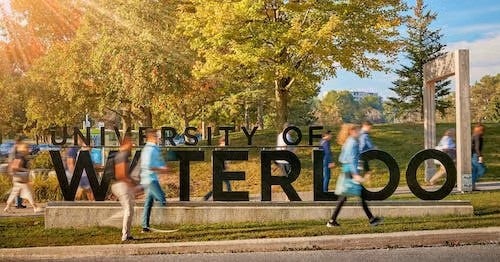
A message from Vivek Goel, President and Vice-Chancellor.
Throughout 2022, steered by a goal of establishing a long-term vision, the University of Waterloo community joined together to answer: What do we aspire to be known for by our 100th anniversary in 2057?
Drawing on the unconventional spirit of our founding, our community put forward ideas to reinvent the culture of our institution as we build a better future.
We call this vision Waterloo at 100.
I would like to personally invite all faculty and staff to participate in the President’s Forum: Waterloo at 100 Vision taking place online and in person at the Humanities Theatre on April 11 at 1:15 p.m.
Join us to learn more about Waterloo’s vision and guiding principles, our differentiators enabling success in the future, the Global Futures and forecasted areas of focus. As valued members of this community, and key players in forming this vision, you will have the opportunity to ask questions and offer comments during the forum’s Q&A session hosted by Vice-President, University Relations Sandra Banks.
This is a free event, followed by refreshments in Hagey Hall. For those who cannot attend in person, the event will be livestreamed via Microsoft Teams.
When: Tuesday, April 11 | 1:15 p.m. to 2:00 p.m.
Where: Humanities Theatre | MS Teams
Note: This Forum, open to faculty and staff, will be hosted as a special session of the Waterloo Staff Conference.
Staff, if you wish to attend for the Staff Conference and Waterloo at 100 launch and forum (either in person or virtually), register here.
Faculty, please register here to attend the Waterloo at 100 Launch and Forum (either in person or virtually).
If you have questions or an accommodation need for this event, please e-mail Sam Toman directly at stoman@uwaterloo.ca, and we will do our best to make appropriate arrangements.
Waterloo welcomes an Eagle Staff
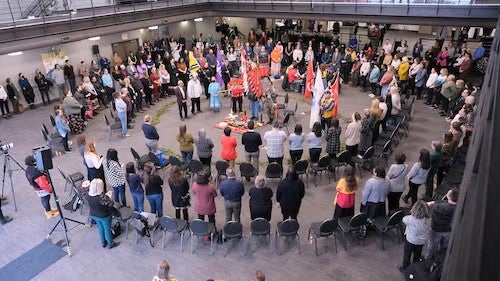
By Stephanie Longeway. A version of this article was originally published on Waterloo News.
On March 27, the University of Waterloo community came together to welcome an Eagle Staff to our institution. The day began with a Sunrise Ceremony followed by a formal introduction ceremony held at Federation Hall. The ceremony began with drumming from the Cedar Hill Singers and a procession, followed by a prayer of thanks led by Elder Bill Woodworth. Indigenous Knowledge Keeper, Elder Myeengun Henry, introduced the sacred Eagle Staff on behalf of the University’s Indigenous community, marking an important step in Waterloo’s journey towards reconciliation.
Henry thanked the crowd for joining in the celebration and said, “we are going to witness a monumental moment for the University as we act on reconciliation … Our University will be able to say that we are one of the few in Canada that holds an Eagle Staff in such honour.”
An Eagle Staff is an important element of the Indigenous relationship to Earth and those that have protected it. By introducing the Eagle Staff, the University honours the responsibility to take on Indigenous perspectives in the ways we teach, govern and behave as an institution.
In recognition of the four directions of Earth, Henry presented the Staff to Waterloo’s president and vice-chancellor, Vivek Goel, four times to mark the transfer of the Staff to the University.
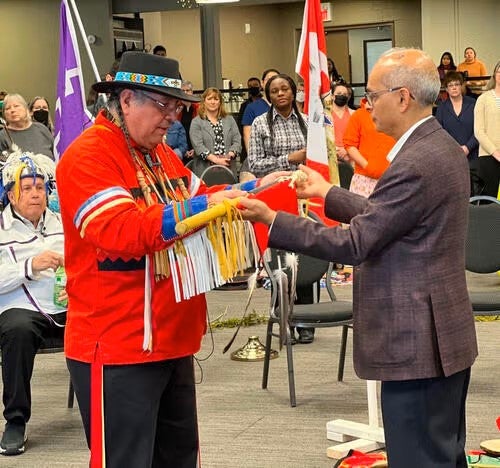
“Last fall we made a formal commitment to reconciliation, Indigenization and decolonization. Part of that commitment means ensuring that Indigenous knowledge and perspectives are represented at our institution. It also includes celebrating Indigenous identity and culture here on our campuses and surrounding community,” said Goel after receiving the Eagle Staff. “And so today, it is our great honour to welcome an Eagle Staff to our campuses.”
The Eagle Staff will be present at future Waterloo ceremonies and celebrations and will have a prominent place in convocation ceremonies.
“The Eagle Staff will enter convocation first, before the mace or the flag. The Staff clears the way for everything that comes after it,” said Jean Becker, associate vice-president of Indigenous Relations. “An eagle represents love … Love is the first teaching because without love you cannot achieve the rest of your teachings. It takes love to lead the way.”
Becker noted that the Eagle Staff will undergo a transformation led by a group of Indigenous students. Eagle Staffs are unique and adorned with beadwork and feathers that represent a specific meaning to the communities who honour them. She said, “We will be having our students help us create what the Staff will be for the University. It will be done very deliberately and thoughtfully of the next couple of months.”
The Eagle Staff will be representative of the University’s First Nations, Métis and Inuit community members, as well as their traditions, cultures and strengths. The President explained that he hopes this Eagle Staff will also serve as a reminder of the University’s responsibility to Indigenization.
“It is my hope that the Staff will serve as an important symbol and reminder of the commitment we made to reconciliation and serve as inspiration for our University community today and for future generations,” Goel said.
Bursary opportunity re-launched for students impacted by conflict or risk
A message from Graduate Studies and Postdoctoral Affairs and Student Awards & Financial Aid.
Originally launched in November 2022 with the support of generous donations, limited funding is still available to support undergraduate and graduate students registered at the University of Waterloo, through the Students-at-Risk Bursary.
This program is available to students who have had their program of study disrupted by conflict, war or changing political environments in their country of origin or where they were last registered prior to relocating to Waterloo to continue their program.
Full details, including application instructions, can be found on the graduate and undergraduate databases. Applications and required supporting documentation (as outlined on the application form) must be submitted by April 17, 2023.
Faculty of Mathematics hosts Research Discovery Days in April
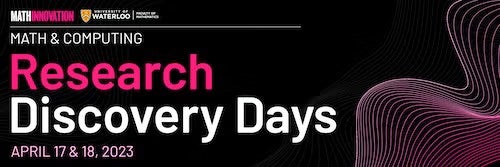
A message from the Faculty of Mathematics.
Faculty, staff, and community members are invited to attend Research Discovery Days, a two-day showcase of research and innovation in the Faculty of Mathematics. The event, which runs from April 17 to 18, will feature presentations on cutting-edge faculty and graduate student research, including keynotes by Dr. Anita Layton (Applied Mathematics), Dr. Michele Mosca (Institute for Quantum Computing), and Dr. Ihab Ilyas (Cheriton School of Computer Science). The event will also feature workshops, networking opportunities, and a special keynote by Math alum Steven Woods, a successful start-up founder with thirty years of experience in the tech industry.
Learn more about Research Discovery Days and register to attend.
Students who played sports before the pandemic did better during lockdowns
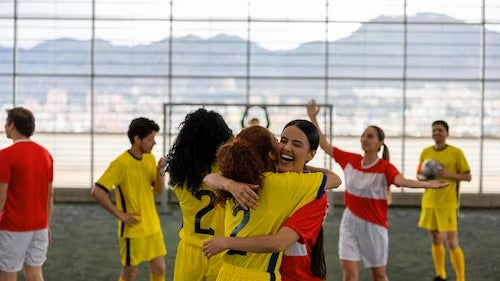
A history of participating in campus recreational sports can offset stress and contribute to academic competence even during high-stress periods such as a pandemic lockdown, shows a new study.
Researchers at the University of Waterloo found that participation in activities such as fitness classes and intramural and drop-in sports before the pandemic was linked to lower levels of stress and higher levels of perceived competence to handle challenges and master school workload during the lockdown.
The study used factor and regression analyses based on self-reported responses from 116 students active in campus recreational sports at two-time points – January 2020, before the pandemic and April 2020, after lockdowns.
“Our findings suggest that the impact of campus recreational activities on reducing stress went beyond the obvious physical health benefits and contributed to overall well-being even down the line,” said Steven Mock, a researcher in the department of Recreation and Leisure Studies.
“It’s possible that students who had learned how to deal with challenges and losses in the context of sport and recreational activity developed key skills such as adaptability that helped them manage with pandemic-related setbacks.”
At the beginning of winter 2020, stress levels for students were generally low. Managing academic demands, building new relationships and trying to achieve personal goals were the top three stressors at that time.
“Students had just come back from the holiday break, their academic workload was still low, and they were not anticipating any societal disruption such as COVID-19,” said co-author Narges Abdeahad, a former PhD candidate in the department of Recreation and Leisure Studies.
By April 2020, after lockdowns had begun, the overall level of stress had increased to above the midpoint, and the top stressors had changed to online delivery of quizzes and exams, the influence of the pandemic on their lives and managing academic demands.
“We also found that graduate students and, even more so, international students had very low participation in campus recreational sports pre-pandemic, which has wellness implications for these two groups of students,” said Abdeahad.
“Since campus recreational sports appear to help develop lifelong skills that offset stressful events, educational institutions should consider including campus recreational sports as a strategy to enhance student mental health and well-being.”
The study, “The role of past campus recreational sports participation in predicting students’ stress and competence during the COVID-19 pandemic”, was co-authored by Abdeahad and Mock and published in the Journal of Leisure Research.
Link of the day

Gordon Moore of Moore's Law fame, dead at 94
When and Where to get support
Students can visit the Student Success Office online for supports including academic development, international student resources, immigration consulting, leadership development, exchange and study abroad, and opportunities to get involved.
Instructors looking for targeted support for developing online components for blended learning courses, transitioning remote to fully online courses, revising current online courses, and more please visit Agile Development | Centre for Extended Learning | University of Waterloo (uwaterloo.ca).
Faculty, staff, post-doc and graduate student instructors can find upcoming teaching and learning workshops, self-directed modules and recordings of previous events on Centre for Teaching Excellence Workshops and Events page.
Instructors can access the EdTech Hub to find support on Waterloo’s centrally supported EdTech tools. The Hub is supported by members of IST’s Instructional Technologies and Media Services, Centre for Teaching Excellence, Centre for Extended Learning and subject matter experts from other campus areas.
Supports are available for employees returning to campus. Visit IST’s Hybrid Work and Technology guidelines and workplace protocols to assist with the transition.
Students with permanent, temporary and suspected disabilities and disabling conditions (medical conditions, injuries, or trauma from discrimination, violence, or oppression) can register with AccessAbility Services for academic accommodations (classroom accommodations, testing accommodations, milestone accommodations).
Instructors can visit AccessAbility Services' Faculty and Staff web page for information about the Instructor/Faculty role in the accommodation process. Instructors/Faculty members are legally required to accommodate students with disabilities. AccessAbility Services (AAS) is here to help you understand your obligations, and to offer services and resources to help you facilitate accommodations.
Did you know that the Writing and Communication Centre offers many in-person and virtual services to support you with any writing or communication project? This term we've added The Write Spot: a new student space in South Campus hall, complete with bookable workspaces, drop-ins with our peer tutors, and free coffee and tea. We also have one-to-one appointments with our writing and communication advisors and peer tutors, email tutoring for grads and undergrads, drop-ins at Dana Porter Library, online workshops, writing groups, English conversation practice, and even custom in-class workshops. For any communication project, the Writing and Communication Centre is here to support you.
Research Ethics: Find yourself with an ethical question, unsure if your work requires an ethics review, or need advice about putting together a research ethics application? Reach out to one of our friendly staff by booking a consultation or email us with your questions.
Co-op students can get help finding a job and find supports to successfully work remotely, develop new skills, access wellness and career information, and contact a co-op or career advisor.
The Centre for Career Action (CCA) has services and programs to support undergrads, grad students, postdocs, alumni, and employees in figuring out what they value, what they’re good at, and how to access meaningful work, co-op, volunteer, or graduate/professional school opportunities. Questions about CCA's services? Live chat, call 519-888-4047, or stop by our front desk in the Tatham Centre 8:30 a.m. to 4:30 p.m., Monday to Friday.
Drop-in to in-person Warrior Study Halls on Thursdays from 5:00 p.m. to 6:30 p.m. in DC and DP. Join a Peer Success Coach to set goals and work independently or in groups each week.
Renison's English Language Institute continues to offer virtual events and workshops to help students practice their English language skills.
If you feel overwhelmed or anxious and need to talk to somebody, please contact the University’s Campus Wellness services, either Health Services or Counselling Services. You can also contact the University's Centre for Mental Health Research and Treatment. Good2Talk is a post-secondary student helpline available to all students.
The Library is here to help, both in person and online. Our spaces are open for access to book stacks, study spaces, computers/printers, and the IST Help Desk. For in-depth support, meet one-to-one with Librarians, Special Collections & Archives and Geospatial Centre staff. Visit the Library’s home page to access our online resources for anywhere, anytime learning and research.
The Faculty Association of the University of Waterloo (FAUW) continues to advocate for its members. Check out the FAUW blog for more information.
The University of Waterloo Staff Association (UWSA) continues to advocate for its members. Check out the UWSA blog for more information.
The Office of Equity, Diversity, Inclusion & Anti-racism (EDI-R) works with students, faculty and staff across campus to advance equity and anti-racism through evidence-based policies, practices and programs. If you have a concern related to anti-racism and/or equity, please complete our intake form.
The Sexual Violence Prevention and Response Office (SVPRO) supports all members of the University of Waterloo campus community who have experienced, or been impacted, by sexual violence. This includes all students, staff, faculty and visitors on the main campus, the satellite campuses, and at the affiliated and federated Waterloo Institutes and Colleges. For support, email: svpro@uwaterloo.ca or visit the SVPRO website.
The Office of Indigenous Relations is a central hub that provides guidance, support, and resources to all Indigenous and non-Indigenous campus community members and oversees the University's Indigenization strategy.
The Waterloo Indigenous Student Centre, based at United College, provides support and resources for Indigenous students, and educational outreach programs for the broader community, including lectures, and events.
WUSA supports for students:
Peer support - MATES, Glow Centre, RAISE, Women’s Centre - Click on one of the links to book an appointment either in person or online for the term.
Food Support Service food hampers are currently available from the Turnkey Desk 24/7 in the Student Life Centre. Drop-off locations are also open again in SLC, DC, DP, SCH, and all residences.
Co-op Connection all available online.
Centre for Academic Policy Support - CAPS is here to assist Waterloo undergraduates throughout their experience in navigating academic policy in the instances of filing petitions, grievances and appeals. Please contact them at caps@wusa.ca.
WUSA Student Legal Protection Program - Seeking legal counsel can be intimidating, especially if it’s your first time facing a legal issue. The legal assistance helpline provides quick access to legal advice in any area of law, including criminal. Just call 1-833-202-4571.
Empower Me is a confidential mental health and wellness service that connects students with qualified counsellors 24/7. They can be reached at 1-833-628-5589.
GSA-UW supports for graduate students:
The Graduate Student Association (GSA-UW) supports students’ academic and social experience and promotes their well-being.
Advising and Support - The GSA advises graduate students experiencing challenges and can help with navigating university policies & filing a grievance, appeal, or petition.
Mental Health covered by the Health Plan - The GSA Health Plan now has an 80 per cent coverage rate (up to $800/year) for Mental Health Practitioners. Your plan includes coverage for psychologists, registered social workers, psychotherapists, and clinical counselors.
Dental Care - The GSA Dental Plan covers 60 to 70 per cent of your dental costs and by visiting dental professionals who are members of the Studentcare Networks, you can receive an additional 20 to 30 per cent coverage.
Student Legal Protection Program - Your GSA fees give you access to unlimited legal advice, accessible via a toll-free helpline: +1-833-202-4571. This advice covers topics including housing disputes, employment disputes, and disputes with an academic institution.
The Graduate House: Open Monday to Tuesday 11:30 a.m. to 7:00 p.m. and Wednesday to Friday 11:30 a.m. to 9:00 p.m. We’re open to all students, faculty, staff, and community members. The Graduate House is a community space run by the GSA-UW. We’re adding new items to the menu. Graduate students who paid their fees can get discounts and free coffee.
When and Where
Fitness and Personal Training - Registrations opened January 5 this winter with Personal Training and Small Group Training as well as a Free Warrior Workout Program.
Waterloo Warriors Youth Camps. Spring and Summer camps available for Boys and Girls ages 5-18. Baseball, Basketball, Football, Volleyball, Hockey and Multi-Sport and Games. Register today.
Student Health Pharmacy in the basement of the Student Life Centre is now offering Covid booster shots (Pfizer and Moderna) and flu shots. Call 519-746-4500 or extension 33784 for an appointment. Walk-ins always welcome.
Introduction to Disability Justice – Debrief Session, Tuesday, March 28, 11:00 a.m. to 12 noon, online.
Research Talks – “Sustainable Urban Environments,” Tuesday, March 28, 6:00 p.m. to 9:00 p.m., Four Fathers Brewing Co., Cambridge. Please register as seating is limited.
The Wicked Problem of Climate Change Symposium, Tuesday, March 28, 6:30 p.m., SLC Black and Gold Room.
Designing for Disability and Accessibility, Thursday, March 30, 2:00 p.m. to 3:15 p.m., the Games Institute, EC1.
NEW - Balinese Gamelan Ensemble Concert, Saturday, April 1, 7:30 p.m., Humanities Theatre. Free admission.
NEW - Prime Time Jazz: UWaterloo Jazz Ensemble, Sunday, April 2, 2:00 p.m., Great Hall (room 1111) at Conrad Grebel University College. $5 students/$10 general, tickets available at the door, reception to follow.
NEW - Karlsruhe Institute of Technology (KIT) presentation by Dr. Klaus Rümmele, Tuesday, April 4, 10:00 a.m., EC5 – GEDI Boardroom.